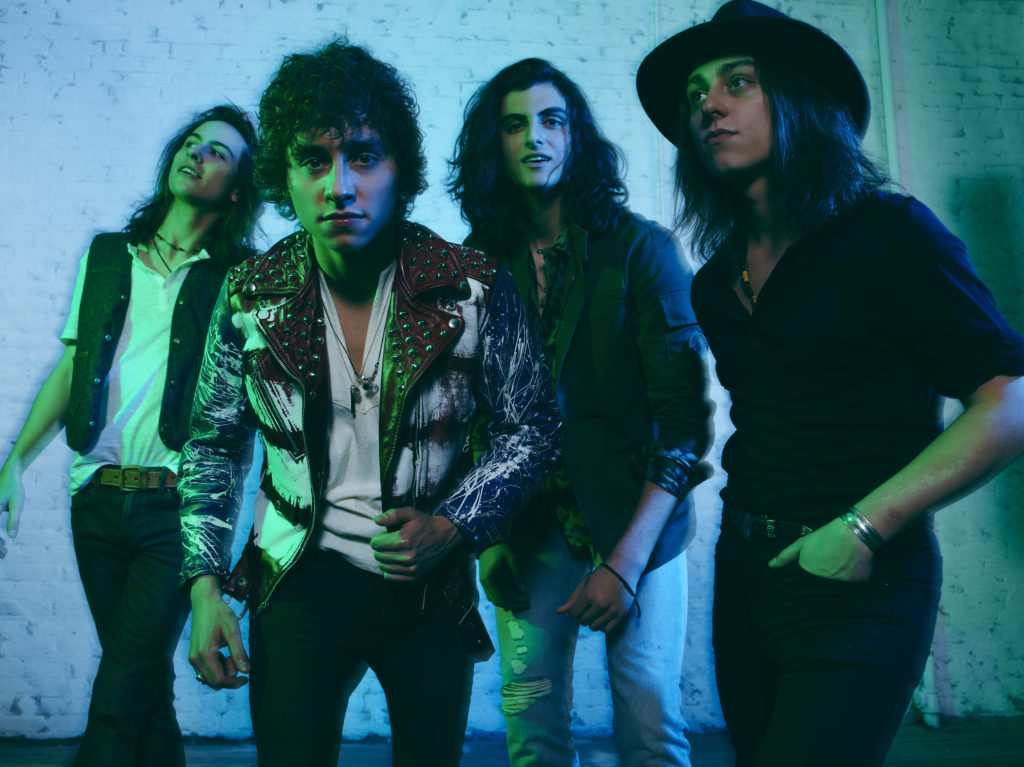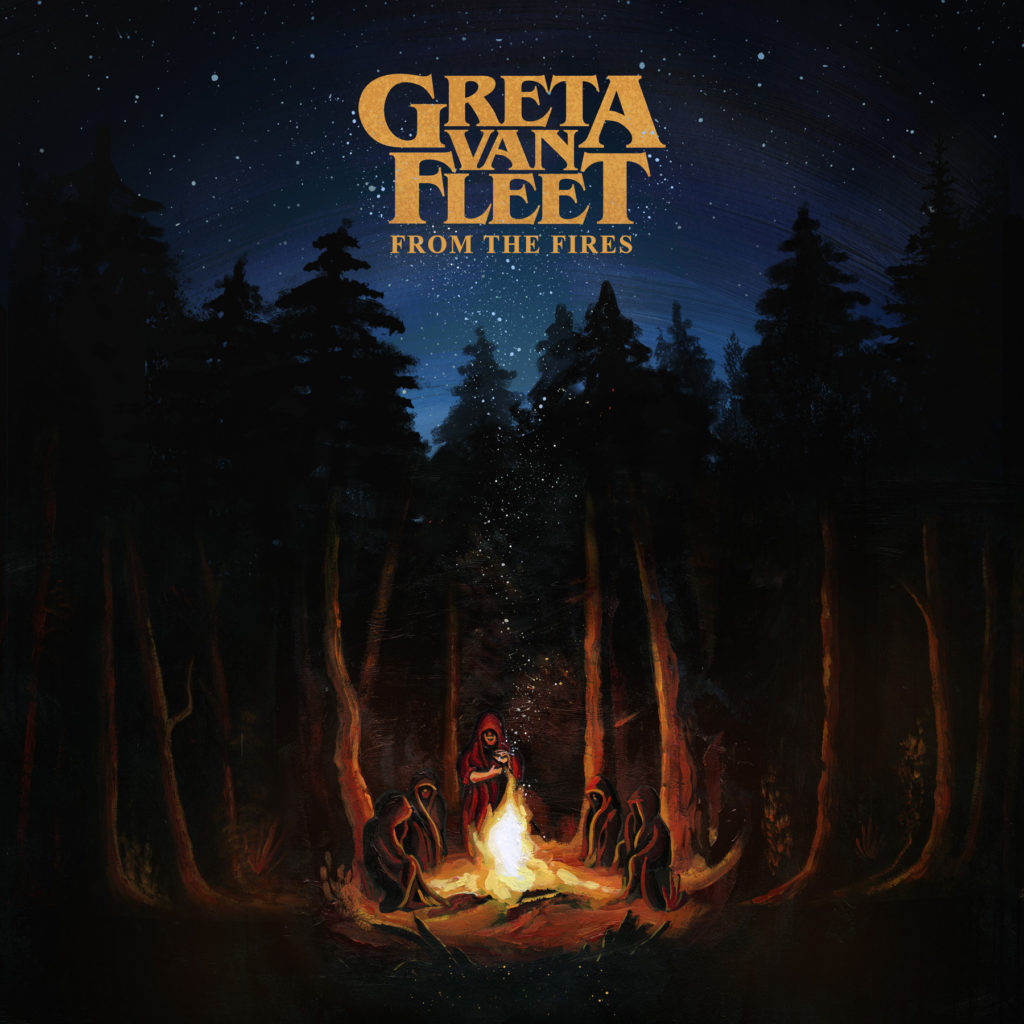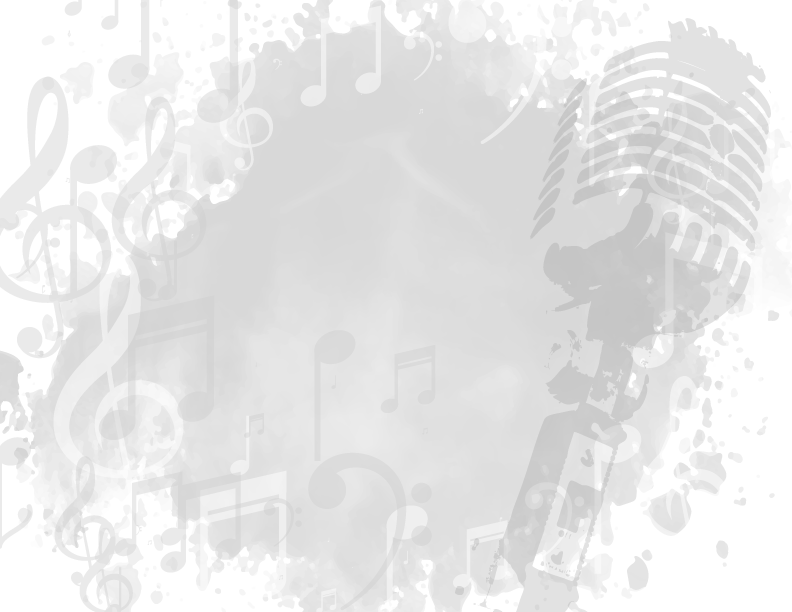Band On Fire: A Conversation with Jake Kiszka of Greta Van Fleet
Let’s cut right to the chase: Yes, the newest rock sensation on the block — a four-piece from Frankenmuth, Michigan (pop. 5131) named Greta Van Fleet — has a distinct “Led Zeppelin-esque” ring to some of their songs.
The tiny vocal minority crying foul are claiming the similarities are too close to their beloved Zep, especially the vocal stylings of the group’s golden-throated, 21-year-old singer Josh Kiszka. The Houses of the Holy have been robbed.
On the other side of the fence, however, is a huge and rapidly growing legion of Fleet fans who have embraced the quartet at face value. Zep or not, they say, it doesn’t matter. This is about the music being created by Kiszka and his twin brother Jake (guitar), 18-year-old younger brother Sam (bass), and 18-year-old and longtime family friend Danny Wagner (drums). Simply put, the music touches and moves them, and they like it.
It’s been a long time since they’ve rock and rolled (like this).
The band’s rapid ascent to national prominence began with the release of their EP “Black Smoke Rising,” which struck a nerve upon its release, eventually working its way into the Billboard 200. Lead-off single “Highway Tune” topped the Billboard Mainstream Rock and Active Rock rock stations in September 2017. Not content to rest on its laurels, the band gave its fans an early Christmas present in the form of more recorded material recently, this time a double EP, “From the Fires,” released on Nov. 10.
As the band prepared to embark on a tour in support of the album, guitarist Jake Kiszka spent some time with ListenIowa to talk about how Greta Van Fleet came to be, the band’s cornucopia of artistic influences and lessons learned on the road.

How does it feel be to a part of one of the hottest young rock acts out there right now?
It’s very humbling. We’re all very excited. I don’t think that any of us had really expected to garnish that kind of immediate attention.
What do you think it is, then, that has set you guys apart and brought listeners to you so quickly?
I suppose that what we’re doing in our spectrum and what’s going on there musically, I would say it’s quite opposed to the music now. I think there’s a lot of truth and honesty in the music we’re writing, and I think people hear that I think it’s special to them, you know?
It sounds like what you’re telling me is that you’re not a fan of pop or top 40 music.
If you’re saying it, then yes. (laughs)
As a guitar player, how did you develop your style to where it is at this point?
Growing up listening to a lot of fundamental music, and a lot of roots stuff in blues, folk, jazz and soul, there were a lot of things that I was taken by. Guitar players like Elmore James, John Lee Hooker and Lead Belly and things like that. I bought my first 12-string because I wanted to emulate what Lead Belly (Huddie William Ledbetter) was doing. I learned slide from Elmore James and Duane Allman, who were big influences of mine, and a lot of the guys from the British invasion — Eric Clapton, Pete Townsend, Jeff Beck and Jimmy Page — and of course, Hendrix. Woody Guthrie was a big folk influence of mine from an acoustic perspective.
You sound like an “old soul,” so to speak, and your age belies your musical knowledge. There had to be an introduction point to this material, though. How did these artists even get onto your radar?
Growing up in an artistic environment gave us a unique perspective early on. Growing up in a family that is musically inclined, and their friends being so artistically and musically inclined, being surrounded by it constantly was certainly influential.
What is the foundation of Greta Van Fleet? How and when did the band come to be?
Because of the creative household we grew up in, and it wasn’t just music initially. There a lot of things like film and literature, so everybody kind of filled in. Josh was very film and literature oriented, and I was the first one playing music. It wasn’t until about high school that I started having buddies over to jam and there was a feeling of a need to create something. Around my sophomore year, I would bring around a friend who was a drummer, and we’d play in the garage. We’d play a lot of The Black Keys’ “Magic Potion” album, and that sort of stuff. Eventually, Josh came in, and then Sam started playing bass, so that was the initial formation. A year later, the drummer couldn’t keep up, I suppose, and we needed a replacement, so an obvious choice was Danny, who we’d grown up with. He was always around, and went to every show we ever played. For about a year-and-a-half, he come in and jammed with us and play on weekends with us. He knew how to play every single one of my riffs on guitar. (laughs) So when he played with us, it was just like an explosion. That was how we got started.
And where did the name Greta Van Fleet come from?
That’s great, because it kind of ties back to the previous drummer, who sometimes would tell us that he would have to leave practice so he could go help his grandfather cut wood for Gretna Van Fleet (his grandmother). Josh said, “We should use that.” We had been trying to come up with names over and over for a very long time, and had a show the very next day. So we had to decide what it was going to be, so we took the “n” out. So that day, her name was on the marquee, and everyone’s calling her and asking her if she was playing in town. (laughs) She was like, “I hope not, because I haven’t practiced.” She showed up — and bear in mind that she’s in her early 80s — and sat through two hours of really loud rock and roll music. She came backstage after the show, and she was really happy we were using her name, and she gave us her blessing, which is cool because she’s kind the of the town matriarch. She’s always been there, so it worked out and she was happy about that. And we can sort of take a piece of home with us anywhere we go.
Let’s talk about the EP, “Black Smoke Rising.” Finding a studio, renting the time, and the financial burdens that go with it had to be daunting for a group of young kids.
Yeah, we’d been writing for a really long time and had stockpiled songs. We had been in some other studios in Michigan, and we’d get a lot of great material from there and sort of learn the ropes. We wanted somewhere that we could have more control and perhaps create something more with the amount of attention we wanted to give the material, so we found a producer, Al Sutton, owner of Rustbelt Studios in Detroit. We sent out some of our stuff, he liked it, and got in there and started working. For the first two years, we were playing shows and putting all that money into the studio. After two years of that, we were finally able to have a bunch of songs recorded and select the ones that we wanted for “Black Smoke Rising.”
So you have a lot of songs written that just didn’t make the cut for “Black Smoke Rising.”
Yeah, there’s sort of an archive of songs we have, whether they’re demoed or recorded, that are being written. And we have about 25 songs that have been recorded, 10 that are demoed, and another 12 we are working on now. There’s a lot of material. With “Black Smoke Rising,” we kind of wanted to kick down the doors with some of the more aggressive material.
You guys have a softer, less aggressive side, too, then.
Oh, yeah, definitely. That’s another element of us that hasn’t been showcased yet. That’s sort of what the initial intent is with the double EP, “From the Fires.” There are two new songs and some covers that we do, including “A Change Is Going To Come,” by Sam Cooke, which was our soul influence that we wanted to showcase. With “Meet On the Ledge,” we wanted to show our folk influences, so there’s more dimension, and the dynamics are sort of spreading out. There are a lot of ballad-like songs that have been written, and a lot of acoustic songs that we used to play. In a two-hour set, we’d have about 45 minutes dedicated to just acoustic. That was pretty awesome and something we miss a lot.
What is the creative process? Do you guys build from a riff, a vocal melody or a combination of both?
It varies. Every song is written in a different way. Usually songs come together rather spontaneously. I can bring an arranged song to the guys and ask the guys what they think, and they’ll put their own piece on the song. Sometimes Josh has a story he wants to tell, and we can build a song around that dialogue.
Working with brothers: advantage or disadvantage?
A little bit of both. (laughs) I guess it’s an advantage until it comes to an artistic difference. Growing up in the same household, we share a lot of the same influences, which is a benefit. Musically and artistically we can be on the same page and we kind of see things similar. But when two people are passionate about something that’s different, there’s a window to be broken or a fist to be thrown. (laughs) But as we’ve grown older, we’ve kind of learned to respect each other’s space.
How much touring have you guys done up to this point?
We started playing quite a bit of shows around Michigan, and it’s expanded from that. We start playing a lot of tri-city shows, and then pushed on toward Detroit and Grand Rapids. Then it became tri-state, and when we decided we wanted to go with a label, we started going outside of the tri-state. We’ve completed a tour of the East Coast, through the Midwest and into Oregon and California and back. It sort of spread out and grew as we pushed it.
As a bunch a wide-eyed, young men on the road, you guys had to learn a lot out there.
(laughs) It’s interesting, coming from such a small town, and being privy to that sort of psychology that a lot of people have. Seeing all these new places, new geographies and people with all these different mindsets, it’s been expansive for us spiritually, and we’ve grown as people through these last few months and gaining new perspectives.
With the sudden splash, you’ve been thrown into the spotlight quickly and feeding the promotion machine is a big part of that. How have you guys adjusted to those responsibilities in dealing with so many people who want a piece of you now?
Yeah, we’ve been doing quite a bit of interviews, and in an interesting way, it’s been sort of introspective. It’s difficult telling your own story, and it’s difficult when you’re asked questions about yourself that you don’t know how to answer because you don’t yet even have an opinion yet. It has been a wakeup call.
With success comes more of everything, whether it’s opportunities, money, temptations, whatever. How do you guys keep your heads about you? You aren’t the first young band to come out of the gates sprinting. But more often than not, those bands burned out just as fast. What’s the plan to avoid these pitfalls and maintain some longevity?
Coming home and being around family really is a big part of that. It’s grounding to come home and sort of try to decompress, and go into town where no one really gives a shit who you are. (laughs) And it’s great. That, to us, is important. Family.
So where do you go from here?
We have some touring to do until the end of December, and then we have some shows at home. January pretty much entirely consists of studio time to finish the first full-length album release, which should be 10 original songs that haven’t been released yet. Hopefully that can come out by early-or mid-2018, and after that, it’s touring again. We have a European tour planned, and will be into Canada and South America as well. We’ll be busy.
For more information, visit www.gretavanfleet.com.
GRETA VAN FLEET ON TOUR:


